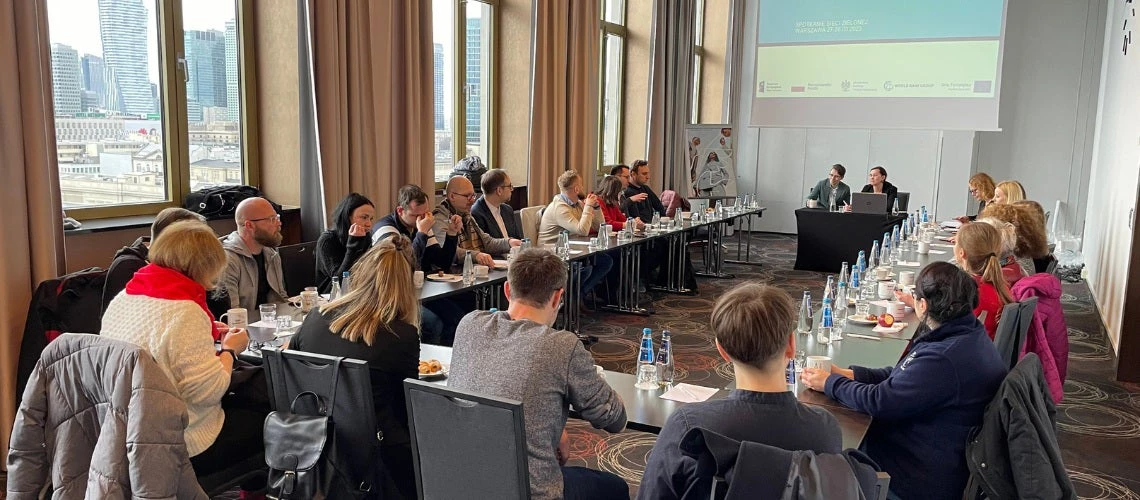 City center Warsaw, Poland
City center Warsaw, Poland
Cities play a pivotal role in the fight against climate change from at least three key perspectives. First, cities are engines of socio-economic growth. Being home to more than half of today’s global population, they are fostering education, social inclusion, and innovation. Second, cities are highly vulnerable to the climate change effects, since they amass a large share of the global population and infrastructure in a small area. And lastly, cities are the main sources of greenhouse gas and CO2 emissions, thus contributing to climate change.
In this connection, the global focus is shifting towards transforming urban centers into resilient and sustainable communities for all. This ensures cities could further develop, but without depriving future generations of their opportunities to live and grow.
Sustainable cities are resilient and able to adapt, mitigate, and promote social, economic, and environmental change
Meeting the challenges of sustainable urban development requires a steady increase in the capacity of cities to plan and implement development projects, as well as favorable regulatory and financial frameworks. This is why more countries today invest in capacity building to equip urban managers and practitioners with knowledge and tools to make better-informed decisions. A successful example of how such capacity-building initiatives promote better urban solutions includes the Cities Partnership Initiative (CPI), launched by the Polish Ministry of Development Funds and Regional Policy of Poland (MDFRP) and implemented in partnership with the World Bank.
Cities in Poland face several obstacles, many of which are exacerbated by climate change
With remarkable economic growth in the past three decades, Poland has become a high-income economy. Yet, Polish cities face a number of challenges including an aging population, air pollution, increasing income inequality, outmigration, as well as the results of the changing climate.
The government of Poland has taken action. In line with the National Urban Policy 2030, it has launched CPI, which brought together 30 urban centers diverse in their geography, size, demographics, and level of expertise to zoom in on three thematic areas: green urban infrastructure, digital urban solutions, and public-private partnerships (PPP). The initiative enhanced the capacity of municipalities in defining challenges to sustainable urban development and designing specific solutions to address them. It also deepened the ministries’ knowledge of systemic challenges facing the cities in the three thematic areas. Finally, a network of urban practitioners was established—something likely to last after the project’s end. The latter soft element enabled an intense information exchange among the participants and a process of co-creation of all the project outputs.
In each thematic area, the participating cities have prepared their Municipal Action Plans (MAPs), which produce scalable solutions that, when tested and proven, can further be used by a wider group of cities in Poland and beyond
MAPs are diverse in their scope, which reflects cities’ ambitions and capacities , they vary from small-scale activities such as green urban acupuncture to large-scale programs, like the revitalization of the city center. Thanks to that, the CPI produced an array of solutions that could be picked up by other urban centers.
One example of the digital network is the city of Świdnica, which has a population of 55,000 people. The city faces challenges with scattered data and lack of information flow. Świdnica is addressing this through the creation of the City Information Architecture -- a nerve system of any urban center that takes stock of digital assets and allows their interconnection and future compatible development.
Another city, Dąbrowa Górnicza (118,000 people) plans to revitalize its post-industrial city center by applying, among others, a public-private partnership approach, which was finetuned during the CPI.
On its path towards sustainable development, the city of Ruda Śląska, a former mining town with 133,000 residents, is designing a green corridor through its post-mining center that is connecting two river beds. The CPI helped the city team further operationalize the green aspects of this transformative project.
Following the multi-governance approach, the Initiative has also benefited the ministries. Thus, the World Bank team has prepared three Improvement Plans (IPs) for the government of Poland, one for each priority area, which identify bottlenecks that hinder cities from implementing solutions and provide specific recommendations to overcome them. IPs will help the central administration adjust the implemented and planned instruments and legal frameworks directed at urban development to even more precisely respond to the needs of local governments.
The CPI has proven to be a successful platform, promoting knowledge exchange and capacity building
The CPI’s blend of in-person engagements, virtual meetings, and consultations has fostered a robust knowledge exchange. This has provided a platform for continuous capacity improvement among the participants and an environment conducive to rapid designing and testing of urban solutions.
The CPI has been beneficial for the participating cities and the ministries, both at the level of individual city solutions and potential systemic changes and improvements. The Initiative has produced valuable knowledge spillovers, and its outputs have the potential to become useful models for other local governments in Poland and abroad. Building a community of urban practitioners through the Initiative has opened many opportunities for further cooperation and knowledge exchange.
In today’s highly urbanized world, cities have to constantly innovate in order to find tangible solutions towards achieving sustainable, resilient, and green urban development, accommodate their growing populations, and provide comfortable living and equal economic opportunities for all. Initiatives like the CPI in Poland are a great example of how building partnerships of like-minded individuals fosters innovations, and knowledge exchange and strengthens the capacity of cities to meet the challenges of sustainable urban development.





Join the Conversation